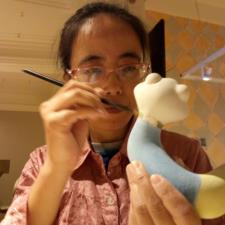1,755 Answered Questions for the topic grammar
Grammar Chinese
03/19/19
一...就... vs. 了...就?
I have been revising HSK 3 grammar, and came across these two alternatives:
- 我妈妈一起床,就做早饭
- 我妈妈起了床,就做早饭
On the basis that my book says that they both mean 'My mum makes breakfast as soon as she...
more
03/19/19
Is there a noun for inverting two clauses so that the personal pronoun is mentioned in advance and only later is its antecedent specified?
>- "Charles can be very sarcastic when he wishes.
- "When he wishes, Charles can be very sarcastic.
Is there a word for this kind of inversion?
03/19/19
What are the various ways to express 'or' and when are they appropriate?
I'd like to get an idea of when it is appropriate to use different expressions for expressing disjunction (of the inclusive AND exclusive variety).
「AとBとCの中で...」、「どちら」、and 「か] come to mind, but I...
more
How can you tell which noun a clause modifies?
I'm a ESOL teacher, and I'm having trouble answering a question that a student asked me recently. We were going over long sentences, and found this one from the New York Times:
> Saudi Arabia...
more
Grammar Chinese
03/19/19
How is 得 used in this sentence?
I have always known 得 as an adverb. For example 跑得很快 ,run quickly or run very fast. The following sentence
> 只有懂得节制欲望的人,才能享受到人生的真正乐趣
means "Only a person that understands (how to) control his...
more
03/19/19
Proper form of なさる - なさります or なさいます?
In Genki II (second ed.), page 168 we are given polite forms of some verbs, among them する with なさる. They have also written that some of them have irregular conjugations in long forms, among them...
more
Correct usage of SIC to express verbatim statements expressed vocally?
Taken literally, *sic erat scriptum* would imply that "[SIC]" is to be used only when expressing a written statement.
Can it also be safely applied to express that which has been expressed...
more
Grammar Japanese
03/18/19
なんか after て- form of a verb?
I am confused by the use of `なんか`, especially after the て-form of a verb. What do: `あきらめてなんかない`, `消えてなんかない` mean? How do they differ from simply saying `あきらめていない`, `消えていない`? What is the purpose of...
more
Grammar Japanese
03/18/19
Choice of tense with そばから?
When using そばから in the sense of "as soon as", everything I find says that you can use either た form/past tense before it, or dictionary form, but not what the difference is. Sometimes people even...
more
03/18/19
Transliteration-transcription method for ancient Greek & Arabic?
I am currently working on a paper that deals with a Psalm from the Septuagint known as the Violet fragment - LXX, Psalm 77.The particular verses i am interested in, are written in Greek uncials,...
more
03/18/19
Why can't だ be used after an I-adjective?
I have been constantly told that だ can not be placed after an I-adjective. Why is that?
Grammar Chinese
03/18/19
Is the measure word optional in 这件毛衣?
I've heard the sentence `这毛衣`, (so without measure word), but my chinese manual always use a measure word after `这`:
> 这件毛衣
>
> 这件苹果
Is the measure word optionnal in after `这` ?
03/18/19
When do we elide “dove è” into “dov'è”?
I have gone through various web pages about elision in Italian. All of them mentioned that we usually elide words like *di, la, le, nella, questo*, et cetera. But none of them mentioned the elision...
more
Grammar
03/18/19
Hale and Peter's or Hale's and Peter's?
Quick questch.
What is grammatically correct:
I heard Hale and Peter's screeches.
or:
I heard Hale's and Peter's screeches.
Grammar German
03/18/19
Auf {einen, einem} Baum klettern - Akkusativ oder Dativ?
Ich habe den folgenden Satz geschrieben:
> Eine Katze ist auf **einen** Baum geklettert.
Meine Deutschlehrerin hat mich korrigiert und geschrieben:
> Eine Katze ist auf **einem** Baum...
more
Grammar Chinese
03/18/19
How is 是 in these two sentences?
I came across these two sentences.
你是在说.... (You're trying say ....)
我不是很懂你的意思。 (I don't really get what you mean.)
And yet, I am trying to wrap my head around why 是 is there in the first place....
more
03/18/19
Contrasting っぽい、らしい、みたい?
For example, the following 3:
女っぽい (おんなっぽい)
女らしい (おんならしい)
女みたい (おんなみたい)
In what situations would you use っぽい over らしい? Does っぽい have negative connotations? Are 女らしい and 女みたい interchangeable as...
more
Range of numbers?
How would one express a range of numbers regarding an action?
Example: I usually study anywhere between 2 to 4 hours a day.
Would the からーまで grammar structure be appropriate...
more
Grammar Chinese
03/18/19
Can you 伤害 a person emotionally?
Can I say “伤害人” in terms of hurting someone emotionally? Or is there another, better, way of saying this?
For example, I'd like to say
"最后还为了伤害他把这个秘密告诉给其他的家人"
Is that a proper usage?
Grammar German
03/18/19
How to say "I come from Beijing, China" in German?
I am learning German now, I just learned how to say "where do you come from?" in German. I can say "I come from Beijing, China" in English, and I may say "Ich komme aus Beijing. Ich komme aus...
more
03/18/19
Can I get the spellchecker in MS Word to remember my grammar decisions?
Sometimes Word will make a incorrect grammar suggestion which I can just ignore.However every time I go to spellcheck it again, it will keep making that suggestion. Is there any way I can get it to...
more
03/18/19
How do I use "as of now" correctly?
Just to clarify, I am not a native English speaker.
I occasionally hear from other non-native English speakers the use of the phrase: "*As of now*" with the meaning of *Currently*.
Initially I...
more
Grammar Chinese
03/18/19
Can you omit the “的” that is after the verb “举办”?
I know that this sentence is correct:
北京奥运会是2008年举办的。
But can you omit the “的” that is after the verb “举办”?
Like this:
北京奥运会是2008年举办[ ]。
I think, I have read some sentences that has omitted...
more
Still looking for help? Get the right answer, fast.
Ask a question for free
Get a free answer to a quick problem.
Most questions answered within 4 hours.
OR
Find an Online Tutor Now
Choose an expert and meet online. No packages or subscriptions, pay only for the time you need.


























